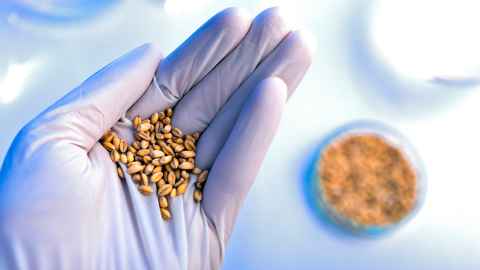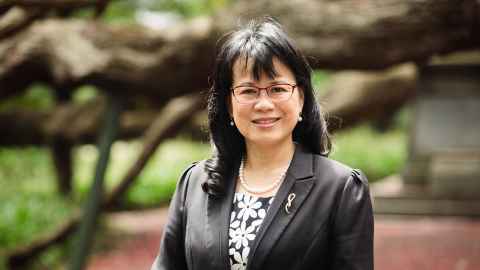Programme overview
The MFoodSci programme includes a mix of taught courses and a research project conducted under the supervision of a food science academic.
The programme provides a bridge for students with an undergraduate degree in food science related disciplines to move into the food science area.
Postgraduate students in food science have a good record of employability in industry.
Find out what our campus locations and facilities have to offer in these videos.
Programme structure
The MFoodSci is an 18-month, 180-point programme with the option of starting in Semester One or Semester Two, and completed over three semesters full-time, with part-time options available.
The programme will be delivered by lectures, seminars, laboratory work, fieldwork and research supervision.
The degree will include 90 points of compulsory taught courses (which includes a 15-point research proposal) and a research project of either 30 points or 60 points.
The research project or dissertation may be undertaken in collaboration with an industry partner, with the research being conducted on campus or at the industry partner site.
A minimum GPA will be required in order to enrol in the dissertation. Students doing the research project will predominantly be those wanting to enter the workforce. MFoodSci graduates will be eligible to apply for entry to a PhD.
Students must complete:
90 points:
CHEMMAT 757: Engineering Biotechnology
FOODSCI 708: Advanced Food Science
FOODSCI 752
At least 30 points from:
FOODSCI 750: Advanced Topics in Food Science 1
FOODSCI 751: Advanced Topics in Food Science 2
Up to 30 points from other 700 level courses offered at this University approved by the Programme Director
30 points:
FOODSCI 790 Research Project
or
90 points:
CHEMMAT 757: Engineering Biotechnology
FOODSCI 708: Advanced Food Science
FOODSCI 752
30 points from:
FOODSCI 750: Advanced Topics in Food Science 1
FOODSCI 751: Advanced Topics in Food Science 2
60 points:
FOODSCI 791: Dissertation
You'll also need to meet other requirements, including time limits and total points limits. See Postgraduate enrolment.
Sample programme structure
Semester 1 60 points
-
- Code:
- FOODSCI 703
- Name:
- Food Processing
- Type:
- Compulsory core course
- Points:
- 15 pts
-
- Code:
- FOODSCI 707
- Name:
- Food Science
- Type:
- Compulsory core course
- Points:
- 15 pts
-
- Code:
- FOODSCI 740
- Name:
- Food Analysis
- Type:
- Elective course
- Points:
- 15 pts
-
- Code:
- FOODSCI 750
- Name:
- Advanced topics in Food Science 1
- Type:
- Elective course
- Points:
- 15 pts
Semester 2 60 points
-
- Code:
- FOODSCI 708
- Name:
- Advanced Food Science
- Type:
- Compulsory core course
- Points:
- 15 pts
-
- Code:
- FOODSCI 751
- Name:
- Advanced topics in Food Science 2
- Type:
- Elective course
- Points:
- 15 pts
-
- Code:
- CHEMMAT 757
- Name:
- Engineering Biotechnology
- Type:
- Compulsory core course
- Points:
- 15 pts
-
- Code:
- FOODSCI 752
- Name:
- Research Proposal
- Type:
- Compulsory core course
- Points:
- 15 pts
Semester 1 60 points
-
- Code:
- FOODSCI 790
- Name:
- Research Project
- Type:
- Elective course
- Points:
- 30 pts
-
- Code:
- FOODSCI 715
- Name:
- Food Allergens and Intolerants
- Type:
- Elective course
- Points:
- 15 pts
-
- Code:
- FOODSCI 706
- Name:
- Food Safety
- Type:
- Compulsory core course
- Points:
- 15 pts
Subjects available in this programme
- Food Science
2025 entry requirements
My highest qualification is from:
Programme requirements
Minimum programme requirements
Minimum requirements listed here are the likely grades required and do not guarantee entry. We assess each application individually and applicants may require a higher grade to be offered a place.
-
Study optionTaught 180 pointsGrade requiredGPA Grade Point Average 4.0
Further programme requirements
Taught 180 points
A Bachelor’s degree majoring in Food Science, or an equivalent subject.
Other pathways to study
You must have completed a Bachelor of Science in a relevant subject from this University with a Grade Point Average of at least 4.0 or higher in 60 points above Stage II, or the equivalent.
Relevant subjects may include biology, biotechnology, chemistry, food process engineering, food science, and pharmacology.
If you do not meet the GPA requirement, you can still gain entry by passing 60 points towards the Postgraduate Diploma in Science in Food Science.
If you do not meet the above entry requirements, but have other relevant experience and think you would be successful in postgraduate study, please contact us to discuss alternative pathways into our programmes.
Programme requirements
Minimum programme requirements
Minimum requirements listed here are the likely grades required and do not guarantee entry. We assess each application individually and applicants may require a higher grade to be offered a place.
-
Study optionTaught 180 pointsGrade requiredGPE Grade Point Equivalent 4.0
An undergraduate degree in Food Science, or another relevant subject
-
QualificationIELTS Academic International English Language Testing SystemScore required6.5
No bands below 6.0.
Further programme requirements
Taught 180 points
You must have completed a Bachelor of Science in Food Science or another relevant subject, at a recognized university (or similar institution).
You will need a GPE of 4.0.
Relevant subjects may include biology, biotechnology, chemistry, food process engineering, food science, and pharmacology.
If you do not meet the GPA requirement, you can still gain entry by passing 60 points towards the Postgraduate Diploma in Science in Food Science.
How much does a Master of Food Science cost per year?
2025 fees
- Domestic students
- NZ$11,046.75*
- International students
- NZ$52,842*
Fees are set in advance of each calendar year and will be updated on this website. Fees are inclusive of 15% GST, but do not include the Student Services Fee, course books, travel and health insurance, or living costs. Amounts shown are indicative only. In addition to the tuition fees, there is a Student Services Fee of $9.24 per point, estimated at $1,663.20 for full-time study (180 points). Fees will be confirmed upon completion of enrolment into courses.
*Please note: amounts shown are indicative and estimates only.
Find out about financial support information
Scholarships and awards
Find out about the scholarships you may be eligible for.
Student loans and allowances
Are you a New Zealand citizen or resident? You could be eligible for a student loan or allowance.
Cost of living
Get an idea of how much accommodation and general living in Auckland will cost.
Key dates
Please note: We will consider late applications if places are still available. International students should start the application process as early as possible to allow sufficient time to apply for a visa.
Application closing dates
- Semester One 2025
- 8 December 2024
Start dates
Here are the start dates for the programme.
| Semester One | Starts – 3 March |
|---|---|
| Ends – 30 June |
| Semester One | Starts – 2 March |
|---|---|
| Ends – 29 June |
Other important dates
See important dates for the academic year, including orientation, enrolment, study breaks, exams, and graduation.
Where could this programme take you?
MFoodSci graduates will receive training in food science and substantive research experience in this field. On completion of the degree, students will be equipped to apply their skills and understanding in careers in the food industry or in food science. This programme also provides a pathway to PhD studies.
Jobs related to this programme
- Food analysis
- Quality control and quality assurance
- Product development
- Sensory & Consumer testing
- Food manufacturing
- Technical sales
- Regulating authorities
- Academic and industry research

Read about the MFoodSci programme in detail and discover whether it's the right study path for you.
Find out moreStudent career planning service
Once you become a student at the University, you can get help with planning and developing your career from Career Development and Employability Services.
Experience the University

Meet the programme director
Learn more about the new MFoodSci programme from Professor Siew-Young Quek, in the School of Chemical Sciences.
Do you need help?
Can’t find the answer in AskAuckland?
Need to speak to someone?
You can phone us directly.
- Auckland
- 923 5025
- Outside Auckland
- 0800 61 62 63
- International
- +64 9 373 7513


